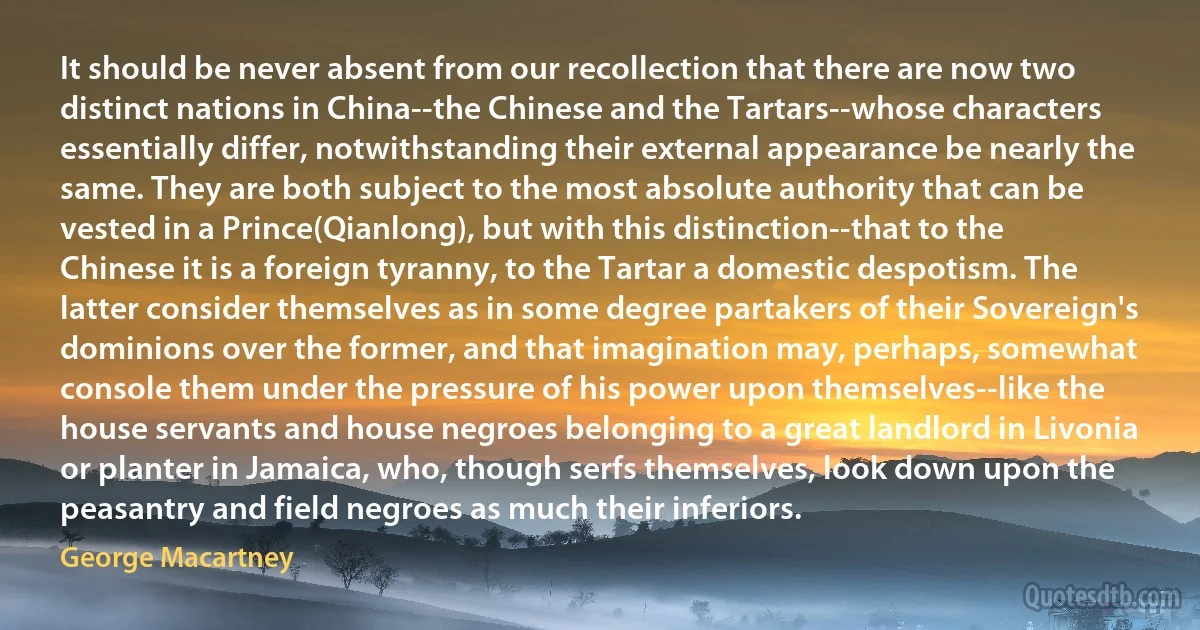
It should be never absent from our recollection that there are now two distinct nations in China--the Chinese and the Tartars--whose characters essentially differ, notwithstanding their external appearance be nearly the same. They are both subject to the most absolute authority that can be vested in a Prince(Qianlong), but with this distinction--that to the Chinese it is a foreign tyranny, to the Tartar a domestic despotism. The latter consider themselves as in some degree partakers of their Sovereign's dominions over the former, and that imagination may, perhaps, somewhat console them under the pressure of his power upon themselves--like the house servants and house negroes belonging to a great landlord in Livonia or planter in Jamaica, who, though serfs themselves, look down upon the peasantry and field negroes as much their inferiors.
George MacartneyRelated topics
absent appearance authority degree despotism field foreign great house jamaica now peasantry perhaps power prince recollection should somewhat underRelated quotes
Moreover I want to tell Dr. Süßheim -- who wants to portray every anti-Semite as a psychopath -- about his racial fellow Dr. Otto Weininger, who as an honest Jew wrote down his thoughts in the book "Sex and Character":
"Jewry seems to be somewhat anthropologically related to the Negroes and the Mongolians. To the Negro points the readily curling hair, to an admixture of Mongolian blood points the very Chinese or Malayan formed skull, that one finds so often among Jews, which matches the usually yellowish complexion ... The fact that excellent men have almost always been anti-Semites (Tacitus, Pascal, Voltaire, Goethe, Kant, Jean Paul, Schopenhauer, Grillparzer, Richard Wagner) can be explained in the following way: they, who have so much more in their own nature than other men, can also better understand Jewry."

Julius Streicher
The prejudices of the second species, since they impose upon the intellect by the sensual conditions restricting the mind if it wishes in certain cases to attain to what is intellectual, lurk more deeply. One of them is that which affects knowledge of quantity, the other that affecting knowledge of qualities generally. The former is: every actual multiplicity can be given numerically, and hence, every infinite quantity; the latter, whatever is impossible contradicts itself. In either of them the concept of time, it is true, does not enter into the very notion of the predicate, nor is it attributed as a qualification to the subject. But yet it serves as a means for forming an idea of the predicate, and thus, being a condition, affects the intellectual concept of the subject to the extent that the latter is only attained by its aid.

Immanuel Kant
In immediate self-consciousness the simple ego is absolute object, which, however, is for us or in itself absolute mediation, and has as its essential moment substantial and solid independence. The dissolution of that simple unity is the result of the first experience; through this there is posited a pure self-consciousness, and a consciousness which is not purely for itself, but for another, i.e. as an existent consciousness, consciousness in the form and shape of thinghood. Both moments are essential, since, in the first instance, they are unlike and opposed, and their reflexion into unity has not yet come to light, they stand as two opposed forms or modes of consciousness. The one is independent whose essential nature is to be for itself, the other is dependent whose essence is life or existence for another. The former is the Master, or Lord, the latter is the Bondsman.

Georg Wilhelm Friedrich Hegel
The chief distinction in the intellectual powers of the two sexes is shewn by man attaining to a higher eminence, in whatever he takes up, than woman can attain - whether requiring deep thought, reason, or imagination, or merely the use of the senses and hands. If two lists were made of the most eminent men and women in poetry, painting, sculpture, music, - comprising composition and performance, history, science, and philosophy, with half-a-dozen names under each subject, the two lists would not bear comparison. We may also infer, from the law of the deviation of averages, so well illustrated by Mr. Galton, in his work on 'Hereditary Genius,' that if men are capable of decided eminence over women in many subjects, the average standard of mental power in man must be above that of woman. ... Thus man has ultimately become superior to woman.

Charles Darwin
If it was possible for men who exercise their reason, to believe that the divine Author of our existence intended a part of the human race to hold an absolute property in, and an unbounded power over others, marked out by his infinite goodness and wisdom, as the objects of a legal domination never rightfully resistible, however severe and oppressive, the inhabitants of these Colonies might at least require from the Parliament of Great Britain some evidence, that this dreadful authority over them has been granted to that body. But a reverence for our great Creator, principles of humanity, and the dictates of common sense, must convince all those who reflect upon the subject, that Government was instituted to promote the welfare of mankind, and ought to be administered for the attainment of that end.

John Dickinson (delegate)
